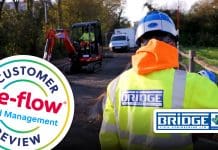With 12 months gone since the Building Safety Regulator took charge as building control authority for higher-risk buildings, it’s a chance to look back on the inaugural year, and look ahead to where improvements might be made
Philip White, HSE director of building safety since April 2023, set out the intentions for the Building Safety Regulator (BSR) to be “a bold and effective regulator, working closely with stakeholders to create a built environment which has resident’s safety at its heart, where everyone is competent and takes responsibility to ensure buildings are of high quality and safe”.
Building control authority for higher-risk buildings
A key part of the changes saw the BSR-installed as the building control authority for building works to both new and existing higher-risk buildings (HRBs), ending the freedom for clients to choose their preferred building control body.
The first year of substantial change to the process presented inevitable challenges. Among those issues included a transition from an old system to the new.
Many inflight HRBs were permitted to remain with their current BC body subject to conditions defined by legislation. Once such condition was for an existing Approved Inspector to register with the BSR as a Registered Building Control Approver (RBCA).
However, not all Approved Inspectors gained registration. Therefore, their existing portfolio of HRBs defaulted to the BSR. This created workload issues as such buildings unfortunately required prioritising to prevent costly delays, and the BSR implementing “operational contingency measures”.
The BSR has statutory timeframes to determine applications, 12 weeks for new build HRBs and eight for works to existing. In a written answer to parliament on 13 September, the building safety minister Rushanara Ali revealed that 45% of the eight-week applications required an extension beyond the time period.
While BSR resources to assess HRB applications may be one factor in delays, there are improvements to be made within the industry. As of 16 September, the BSR has invalidated or rejected more than 40% of applications for HRB approval at Gateway 2 because applications were incomplete or unclear.
To prevent invalidation and rejection, applications should be clear and comprehensive, with high quality accompanying documentation that helps the BSR make informed decisions quicker, reducing delays and ensuring compliance.
Preparing applications to the Building Safety Regulator
Over the last year, BCC Consulting has supported some fantastic clients on some great projects, helping them with their preparation of applications to the BSR to this standard, therefore reducing delays and protracted determination periods.
We are still in the relatively early stages – “teething” some might say – but the signs are positive if we recognise and adopt the benefits of collaborative working.
At BCC Consulting, we are continuing to play our part and will continue to help support the aims for the BSR and industry for effective and efficient regulation with the ultimate goal of securing health and safety for people in and around buildings.
*Please note that this is a commercial profile.














